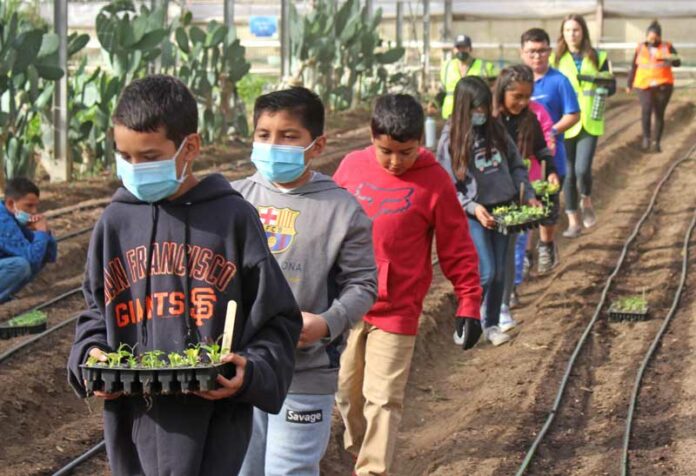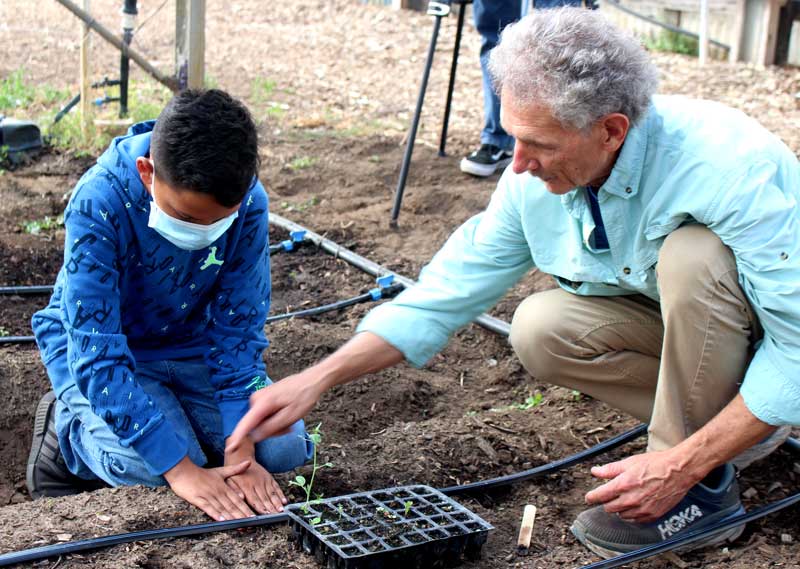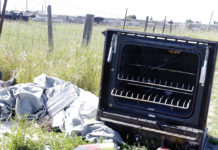
An eager group of fifth graders filed through fresh beds of dirt at Whisky Hill Farm (WHF) in Watsonville Sept. 13, ready to plant their very own seedlings.
Laura Arnow’s fifth grade class from Calabasas Elementary School were there to finally transplant crops they had started growing at their school garden into the ground at their newly established organic garden.
“[Laura] had brought a group of kids here at the end of last year,” said WHF’s Tom Harvey. “They toured the farm, saw what we were doing here. When the kids went back, they decided they wanted to grow their very own garden.”
Arnow and her class decided that instead of the usual school fundraisers such as bake sales and car washes, they wanted to grow their own plants and salad mixes to sell to families at the school’s annual Harvest Faire.
“The kids were driving this,” Harvey said. “They really wanted to do it.”
The project is part of a pilot program of the Pajaro Valley Unified School District (PVUSD), along with the Green Business Network (GBN) and others, where students are learning about organic growing, compositing, agriculture technology and more.
Whisky Hill is a regenerative organic farm created and owned by David Blume. The farm produces year-round crops, with its waste products being used to make bio-refined commercial alcohol at its partner institution, Blume Distillation.
Arnow said that Calabasas has known about WHF for a while, as the farm is located just half a mile down the road from the school.
“It took awhile for us to triangulate,” Arnow said. “Funny enough, after we met we learned that Whisky Hill had plowed our community garden when it first got started. Which is really cool. When we brought our school Green Team up here for a field trip last Spring, it gave us the idea to start working together.”
The students planted a variety of vegetables including radishes, turnips, cabbage, cucumbers, chard, kale, carrots, green onions and more. Arnow said another class might be coming to help plant herbs such as basil, cilantro, parsley, chives, mint, lemongrass, dill and more.

In addition, an art teacher at Calabasas is also getting involved, having students create pots for the produce and herbs to sell during the festival.
Jakki Castorena, a coordinator with GBN and a bilingual sustainability consultant, praised Arnow’s work and said she was very excited for the upcoming Harvest Faire.
“It is a culmination of a lot of things that we’ve been working on,” she said. “It’s really awesome seeing these kids continuing to be involved.”
As David Blume gave the kids a tour and helped them plant their seedlings on Sept. 13, a film crew from Watsonville’s Digital NEST followed. The organization is currently creating a video that Harvey says will be shown to the County Supervisors to encourage support of the pilot program.
“It is my hope to establish more field trips like this with other schools,” Castorena added. “Starlight [Elementary] will be our second school. It’ll be great to see even more schools incorporate some of these sustainable practices.”
Arnow said that for the students themselves, garden projects can have a big impact—especially on those from agriculture communities.
“A lot of these kids’ parents work in the fields,” she said. “Some of them only relate farming to that. This, being here at Whisky Hill, gives them insight into different kinds of jobs in agriculture. More that are about technology and earth-friendly. It shows them there are options, how ag can be sustainable and innovative. That can really make a difference.”












